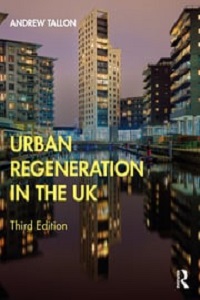How will these resources help you?
With the transfer of retail to out-of-town shopping centres and online, and the movement towards working from home since the pandemic, areas are facing urban decline and deprivation. Regeneration is seen as the answer to breathing life back into these areas, but as these resources will demonstrate, there is more to it than shiny new buildings, cafes and restaurants. There are few resources out there on the subject aimed at secondary schools (most are at a higher level for undergraduates studying town planning). These resources have been carefully selected from Government departments in charge of ‘Levelling Up’ and professional bodies such as the RICS, and include the latest version of the book on regeneration in the UK. All of these are accessible in demonstrating that successful regeneration must improve outcomes for the community. Current textbooks are becoming outdated, but these resources provide fresh case studies (such as the renewal of Shoreditch) to give students a contemporary appreciation of the issues. The pandemic has brought its own challenges to areas that rely on tourism, and the LSE is far less positive on the successes of regeneration. Students are regularly asked to assess the extent of the success of a particular project in exams, and these resources will allow you to support their understanding with up-to-date analysis.
The ‘Levelling Up’ Agenda

Levelling Up the United Kingdom White Paper: Executive Summary
published by the Department for Levelling Up, Housing and Communities, (2022)
This Government White Paper is the ideal resource to start, by outlining the current attitudes towards equality and opportunity in some of the UK’s most deprived areas. Any of the areas covered could serve as effective case studies for students to investigate and bring a more contemporary approach than many current textbooks. The summary is very readable for students and non-specialists, and explains well the components of regeneration, a concept that students can struggle with. On pages 7 and 8, the Levelling Up ‘Missions’ are outlined, which are clear and will tackle student misconceptions.
What makes regeneration successful?

Successful Regeneration: Perspectives from England
by RICS, (2010)
This review by the industry’s professional body outlines 8 components to successful regeneration. Students can use these criteria in evaluating the success of regeneration projects. Of particular interest is number 7 (Focus on opportunities, not just need), linking to the above White Paper on Levelling Up, as regeneration projects can span several economic cycles. This document contains a number of case studies to complement the success criteria.
Regeneration in the UK

Urban Regeneration in the UK
by Andrew Tallon, published by Routledge, (2020), 9781138492523
Andrew Tallon’s books are comprehensive on the subject. This 3rd edition was published ten years after the 2nd and contains up-to-date case studies and more contemporary attitudes to regeneration in the 2020s, speculating on future approaches in a period of economic uncertainty. A range of case studies are explored that have benefited from Government strategy and from initiatives from the cities themselves, to ensure economic competitiveness and tackling social disadvantage. An effective update for teachers to dip in and out of, with sections highly suitable for students in assessing the effectiveness of regeneration strategies. One review states that it is ideal for ‘picking topics, key points, case studies and reading lists in order to delve deeper into some issues’.
Further materials
Turning the tide: coastal regeneration in a pandemic by James Cash, published by RICS, (2022)
Access this resource
Government urban regeneration initiative failed to improve Britain’s most deprived areas, published by LSE, Interview with Professor Henry Overman, (2021)
Read this interview
Mayor of London gives green light for Shoreditch regeneration project by Jane Imrie, published by Bdaily News, (2020)
Read this article
David Newell is Head of Geography at Millais School in Horsham, West Sussex. He has held the GA’s Secondary Geography Quality Mark since 2015, and has worked as a Specialist Leader in Education, advising schools on improving their Geography provision.
Text © David Newell, 2022.
Text © David Newell, 2022.



